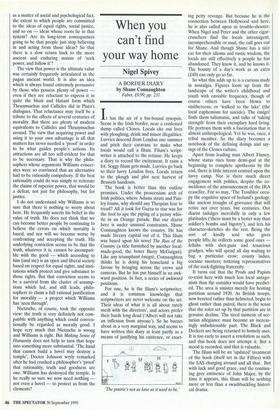When you can't find your way home
Nigel Spivey
A BORDER DIARY by Shane Connaughton Faber, 19.99, pp. 231 It has the air of a bin-bound synopsis. Scene is the Irish border, near a confessed dump called Clones. Locals eke out lives with ploughing, drink and minor illegalities. Luwies descend from London one summer and pitch their caravans to make what locals would call a filum. Filum's script- writer is attached to the retinue. He keeps a diary to record the excitement. It rains a lot. Soggy filum gets made. Luwies go back to their luwy London lives. Locals return to the plough and plot next harvest of Brussels handouts.
The book is better than this outline promises. Under the proscenium arch of Irish politics, where Adams struts and Pais- ley foams, why should any Thespian fear to tread? All it took for Gazza to star was for the fool to ape the piping of a penny whis- tle in an Orange parade. But our diarist here is under unusual constraints. Shane Connaughton knows the country. He has made literary capital out of it. This filum was based upon his novel The Run of the Country (a title furnished by another local- made-good, the boxer Barry McGuigan). Like any triumphant émigré, Connaughton thinks he is doing his homeland a big favour by bringing across the crews and cameras. But he has put himself in an awk- ward position. In fact, a series of awkward positions.
For one, he is the filum's scriptwriter, and it is common knowledge that scriptwriters are never welcome on the set. Their ideas of what it is all about rarely mesh with the directors', and actors prefer their bards long dead (`Albert will not take an inflexion from anyone'). So he buzzes about in a very marginal way, and seems to have written this diary at least partly as a means of justifying his existence, or exact- `The prairie's not as lone as it used to be.' ing petty revenge. But because he is the connection between Hollywood and here, he is also called upon as trouble-shooter. When Nigel and Peter and the other cigar- crunchers find the locals intransigent, incomprehensible or mad, the call goes out for Shane. And though Shane has a nice ear for their idioms and rustic wisdom, the locals are still effectively a people he has abandoned. They know it, and he knows it. The bounty of a day's work as an extra (£40) can only go so far.
So what this adds up to is a curious study in nostalgia. Figures loom up from the landscape of the writer's childhood and youth with enviable frequency, though of course others have been blown to smithereens, or 'walked to the lake' (the local euphemism for suicide). The émigré finds them talismanic, and talks of 'taking strength' from their exemplary hard living. He portrays them with a fascination that is almost anthropological. Yet he was, once, a tribal member. So the diary becomes a notebook of the defining doings and say- ings of the Clones culture.
Apart from leading man Albert Finney, whose status rises from demi-god at the beginning to complete apotheosis by the end, there is little interest centred upon the luvvy camp. Nor is there much direct engagement with politics, despite the co- incidence of the announcement of the IRA ceasefire. For so may, The Troubles' occu- py the cognitive space of Ireland's geology, like ancient troughs of grievance that will retire not over years, but centuries. Our diarist indulges mercifully in only a few platitudes (`there must be a better way than soldier's bombs and bigotry'), and lets his character-sketches do the rest. Being the sort of kindly soul who gives people lifts, he collects some good ones — fellahs with shot-guns and tenacious grudges, who will spend all day waiting to bag a particular crow; county ladies, cocaine snorters; tottering representatives of the cock-fighting fraternity.
It turns out that the Prods and Papists co-exist here with much less local antago- nism than the outsider would have predict- ed. The area is sinister merely for hosting partition around 1920. As British troops, now bereted rather than helmeted, begin to ghost rather than patrol, there is the sense that the roles set up by that partition are in genuine decline. The tired mimesis of sec- tarian allegiance must become an increas- ingly unfashionable part. The Black and Deckers are being returned to homely uses. It is too early to assert a resolution as such, and this book does not attempt it. But a mood is recorded, and that is valuable.
The filum will be an 'updated' treatment of the book (itself set in the Fifties) with the SAS charging around and all that. But with luck and good grace, and the continu- ing grey eminence of John Major, by the time it appears, this filum will be nothing more or less than a swashbuckling histori- cal drama.


































































 Previous page
Previous page